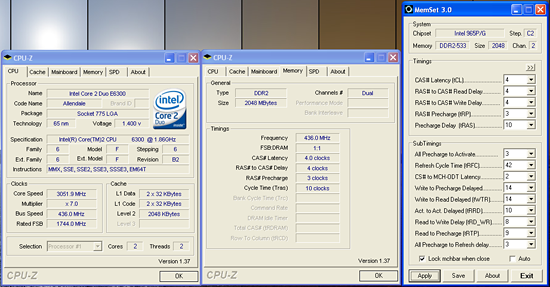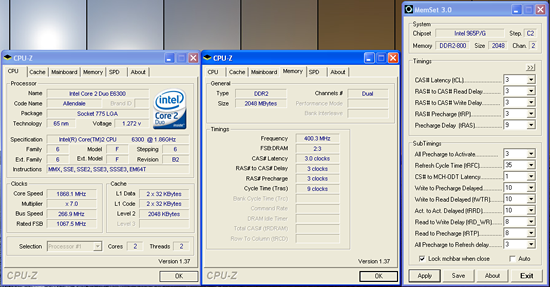Intel P965: Mid-Range Performance Sector Roundup
by Gary Key on October 20, 2006 9:00 PM EST- Posted in
- Motherboards
Abit AB9-Pro: Overclocking
FSB Overclocking Results
Our E6300 posted very good results when compared to our earlier overclocking test results that resulted in a maximum FSB speed of 366. However, the 7x436FSB level is the lowest of our test group today and does not match up to the promise of this board's performance. We also have an issue with our CPU requiring 1.4375V on this board to reach a stable 3.05GHz. We normally only require 1.40V in order to reach this level and noticed the board would not boot without an increase to 1.4375V although it was rock stable at this setting. Vdroop averaged around .02V to .03V during overclocking and heavy system loads. Our memory is usually very stable up to DDR2-900 at 4-3-3-10 settings but required slightly looser timings on this board. Although the overclocking results are not as high as our other boards, the ability to now run up to 436FSB in a stable manner is fine for the majority of people who want to overclock.
Memory Stress Testing
Memory stress tests look at the ability of the Abit AB9-Pro to operate at the official DDR2-800 memory frequency at the best performing memory timings our GEIL PC2-6400 can achieve on this board.
The Abit AB9-Pro was very stable with 2 DDR2 modules in Dual-Channel mode at the settings of 3-3-3-9 at 2.2V with the 1.4 and above BIOS. By increasing the voltage to 2.25V we could run at 3-3-3-6 timings although there were not any real performance improvements unless we utilized MemSet to change other latency settings.
We had to change our timings to 3-4-3-10 from 3-3-3-9 when installing two additional modules. We were able to keep our voltage set to 2.20V at this setting. We were able to maintain these settings up to a 7x405FSB, DDR2-810, setting with 2.30V. Our maximum overclock with four DIMMs installed was 7x418FSB, DDR2-836 4-4-3-12, with the memory set at 2.30V. Once again, we had to use BIOS 1.4 or higher in order for these settings to work.
In fact, on the first two BIOS releases this particular memory would not even boot when installed in this board. The memory itself is designed to run at 2.0V or higher depending upon the latencies selected. GEIL actually rates this memory at 2.4V for 3-4-3-8 operation at DDR2-800 although we have not required voltages above 2.2V at this setting.
FSB Overclocking Results
| Abit AB9-Pro Overclocking Testbed |
|
| Processor: | Intel Core 2 Duo E6300 Dual Core, 1.86GHz, 2MB Unified Cache 1066FSB, 7x Multiplier |
| CPU Voltage: | 1.4375V (default 1.3250V) |
| Cooling: | Scythe Infinity Air Cooling |
| Power Supply: | OCZ GameXStream 700W |
| Memory: | Geil PC2-6400 800MHz Plus (2x1GB- GX22GB6400PDC) (Micron Memory Chips) |
| Video Cards: | 1 x MSI X1950XTX |
| Hard Drive: | Seagate 320GB 7200RPM SATA2 16MB Buffer |
| Case: | Cooler Master CM Stacker 830 |
| Maximum CPU OC: (Standard Ratio) |
436x7 (4-4-4-12, 1:1, 2.3V) 3052MHz (+64%) |
| . | |
 |
| Click to enlarge |
Our E6300 posted very good results when compared to our earlier overclocking test results that resulted in a maximum FSB speed of 366. However, the 7x436FSB level is the lowest of our test group today and does not match up to the promise of this board's performance. We also have an issue with our CPU requiring 1.4375V on this board to reach a stable 3.05GHz. We normally only require 1.40V in order to reach this level and noticed the board would not boot without an increase to 1.4375V although it was rock stable at this setting. Vdroop averaged around .02V to .03V during overclocking and heavy system loads. Our memory is usually very stable up to DDR2-900 at 4-3-3-10 settings but required slightly looser timings on this board. Although the overclocking results are not as high as our other boards, the ability to now run up to 436FSB in a stable manner is fine for the majority of people who want to overclock.
Memory Stress Testing
 |
| Click to enlarge |
Memory stress tests look at the ability of the Abit AB9-Pro to operate at the official DDR2-800 memory frequency at the best performing memory timings our GEIL PC2-6400 can achieve on this board.
| Abit AB9-Pro Stable DDR2-800 Timings - 2 DIMMs (2/4 slots populated - 1 Dual-Channel Bank) |
|
| Clock Speed: | 800MHz |
| CAS Latency: | 3 |
| RAS to CAS Delay: | 3 |
| RAS Precharge: | 3 |
| RAS Cycle Time: | 9 |
| Voltage: | 2.20V |
The Abit AB9-Pro was very stable with 2 DDR2 modules in Dual-Channel mode at the settings of 3-3-3-9 at 2.2V with the 1.4 and above BIOS. By increasing the voltage to 2.25V we could run at 3-3-3-6 timings although there were not any real performance improvements unless we utilized MemSet to change other latency settings.
| Abit AB9-Pro Stable DDR2-800 Timings - 4 DIMMs (4/4 slots populated - 2 Dual-Channel Bank) |
|
| Clock Speed: | 800MHz |
| CAS Latency: | 3 |
| RAS to CAS Delay: | 4 |
| RAS Precharge: | 3 |
| RAS Cycle Time: | 10 |
| Voltage: | 2.20V |
We had to change our timings to 3-4-3-10 from 3-3-3-9 when installing two additional modules. We were able to keep our voltage set to 2.20V at this setting. We were able to maintain these settings up to a 7x405FSB, DDR2-810, setting with 2.30V. Our maximum overclock with four DIMMs installed was 7x418FSB, DDR2-836 4-4-3-12, with the memory set at 2.30V. Once again, we had to use BIOS 1.4 or higher in order for these settings to work.
In fact, on the first two BIOS releases this particular memory would not even boot when installed in this board. The memory itself is designed to run at 2.0V or higher depending upon the latencies selected. GEIL actually rates this memory at 2.4V for 3-4-3-8 operation at DDR2-800 although we have not required voltages above 2.2V at this setting.










62 Comments
View All Comments
JarredWalton - Saturday, October 21, 2006 - link
Oh, trust me, Gary tested with a LOT of RAM types and manufacturers. However, for the *benchmarks* he settled on one specific set of DIMMs. I think he's trying to put together some information on how the various boards worked with other RAM (see above comment from Gary). Cheers!stmok - Saturday, October 21, 2006 - link
LOL...I think its more like: "What the hell were the Abit engineers thinking?!"Based on your experiences, do you know if the Analog Devices AD1988A HD Audio Codec works in Linux? I wouldn't mind going for the ASUS P5B-E at the end of the year.
And finally, is the rev 1.02G mobo available now? Or in a few months time?
Gary Key - Saturday, October 21, 2006 - link
The 1.09 ADI AD1988A drivers worked fine in SUSE 10.1. Realtek has better support at this time but ADI seems to be catching up. Believe it or not, but we booted every board with SUSE 10.1 just to make sure they went to the desktop. We might even do a once in a while look at Linux down the road.
xsilver - Saturday, October 21, 2006 - link
what is the range of overclocking possible with pc6400 ram?without dividers? with dividers?
Gary Key - Saturday, October 21, 2006 - link
Good question, depends on the PC2-6400 RAM. We are working on something right now to answer your question with a few different modules.xsilver - Sunday, October 22, 2006 - link
probably something standard like corsair VS or something priced very similar if there is better performance elsewherexsilver - Sunday, October 22, 2006 - link
also I would assume that 1gig vs. 2gig makes no difference but if it does, it would be good to know.Madellga - Saturday, October 21, 2006 - link
Excellent review Gary. I also look forward for the round 2 and also for a 975/ATI/Nvidia reviews.Please try to mention the Vmch used for the overclocking results, as this says a lot about the motherboads also.
Gary Key - Saturday, October 21, 2006 - link
I am setting up a overclocking settings table and will try to show some additional results with different memory types that we used in testing. I have no idea when this will be finished. ;-)Ryan Norton - Saturday, October 21, 2006 - link
This article is terrific-- now I just need to read the high-end part and I can finally put together a Core 2 Duo system.Will the DS4 be included in the high-end guide? I don't want a DQ-6 because the copper backplate under the processor socket would prevent installation of a Scythe Ninja heatsink.
Are the AHCI issues going to stay the way they are, with needing to load the drivers from a floppy disk during Windows install, or are there any P965 boards that don't require "an engineering degree and a day off" as you guys said?